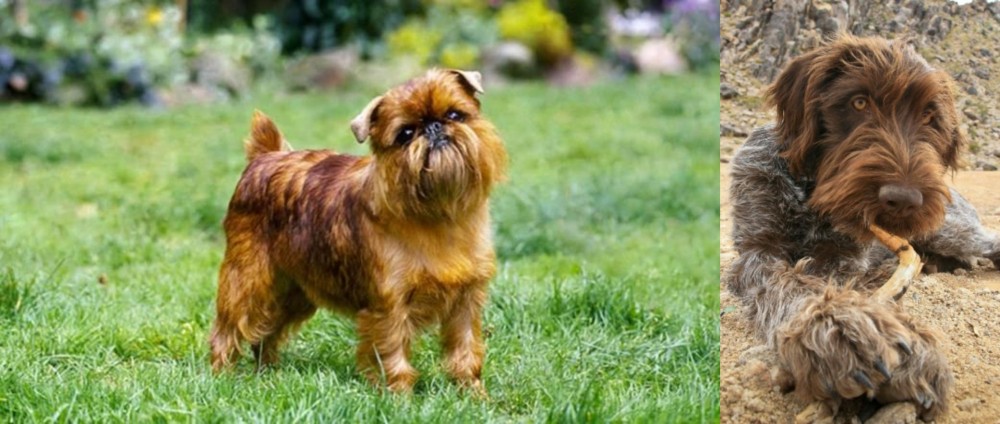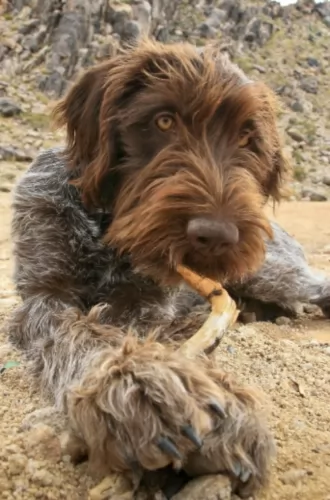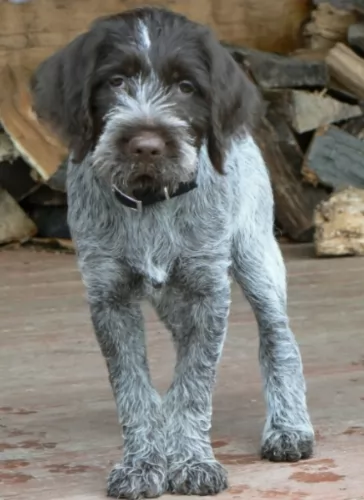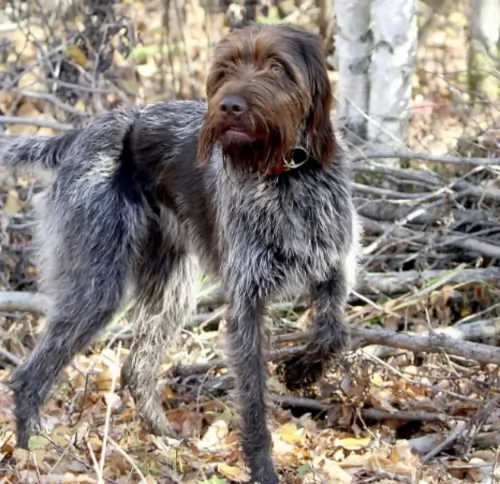 Petzlover
Petzlover Brussels Griffon is originated from Belgium but Wirehaired Pointing Griffon is originated from France. Brussels Griffon may grow 40 cm / 15 inches shorter than Wirehaired Pointing Griffon. Brussels Griffon may weigh 21 kg / 46 pounds lesser than Wirehaired Pointing Griffon. Both Brussels Griffon and Wirehaired Pointing Griffon has same life span. Brussels Griffon may have less litter size than Wirehaired Pointing Griffon. Both Brussels Griffon and Wirehaired Pointing Griffon requires Moderate Maintenance.
Brussels Griffon is originated from Belgium but Wirehaired Pointing Griffon is originated from France. Brussels Griffon may grow 40 cm / 15 inches shorter than Wirehaired Pointing Griffon. Brussels Griffon may weigh 21 kg / 46 pounds lesser than Wirehaired Pointing Griffon. Both Brussels Griffon and Wirehaired Pointing Griffon has same life span. Brussels Griffon may have less litter size than Wirehaired Pointing Griffon. Both Brussels Griffon and Wirehaired Pointing Griffon requires Moderate Maintenance.
 The Brussels Griffon is one of the three different types of Griffons. There is the Belgian, the Petit, and the Brussels Griffon. “Griffon” means wiry and the Brussels Griffon lives up to that moniker. The Brussels Griffon’s coat is longer than that of the Belgian Griffon and the Petit Brabanon (Griffon) has a smooth, short coat. The breed is probably originally developed by crossing Belgian street dogs with the Affenpinsher as early in the 1800’s. They were favored by the cabbies in Brussels as guard dogs. They were also bred to hunt rats. Sometime toward the end of the 19th century, the Griffon was again crossed this time with a pug. This accounts for the type of head that the Brussels Griffon has, namely a brachycephalic head. It also accounts for the smooth coat of the Petit Griffon. The modern-day Griffon may also have been crossed at some time with one or more of these breeds: the English Toy Spaniel, the Irish Terrier and the Yorkshire Terrier.
The Brussels Griffon is one of the three different types of Griffons. There is the Belgian, the Petit, and the Brussels Griffon. “Griffon” means wiry and the Brussels Griffon lives up to that moniker. The Brussels Griffon’s coat is longer than that of the Belgian Griffon and the Petit Brabanon (Griffon) has a smooth, short coat. The breed is probably originally developed by crossing Belgian street dogs with the Affenpinsher as early in the 1800’s. They were favored by the cabbies in Brussels as guard dogs. They were also bred to hunt rats. Sometime toward the end of the 19th century, the Griffon was again crossed this time with a pug. This accounts for the type of head that the Brussels Griffon has, namely a brachycephalic head. It also accounts for the smooth coat of the Petit Griffon. The modern-day Griffon may also have been crossed at some time with one or more of these breeds: the English Toy Spaniel, the Irish Terrier and the Yorkshire Terrier.
By 1880, the breed was recognized and appeared in the Brussels Exhibition of 1880. They were also found in paintings of the same era by the Flemish painter, Van Eyck. In the beginning of the 20th century, the breed was extremely popular with the nobility in Belgium. As with so many other breeds, the number of Brussels Griffon was greatly reduced during the First World War. It did not take them long however to make a comeback after the war. Their popularity then spread around the globe.
The European FCI considers the Brussels Griffon, the Belgian Griffon and the Petit Brabancon (Griffon) to be three separate breeds with no interbreeding among them. They are shown as three separate breeds in Europe, with the difference between the Belgian and Brussels being the accepted colors. The Brussels is only red in color while the Belgium Griffon can be in all other colors. In the United States the three types of Griffons are considered one breed with three varieties. Only the Brussels Griffon is recognized by the AKC. The difference in coat and color make for the different varieties in the U.S.
 Known also as the Korthals Griffon, the Wirehaired Pointing Griffon is a hunting- and gundog. It was Eduard Karel Korthals who is thought to have brought about this dog breed around 1873.
Known also as the Korthals Griffon, the Wirehaired Pointing Griffon is a hunting- and gundog. It was Eduard Karel Korthals who is thought to have brought about this dog breed around 1873.
He was a Dutchman living in France. It is believed that quite a few dog breeds were used to bring about this dog such as the Otterhound, Spniels, Setters and possibly a Pointer. The dog is known as a supreme gundog and it is a very popular dog breed.
Edward Korthals of Holland was looking for an ideal gun dog. It was in 1888 that the first Griffon Club was formed. It was only in 1916 that this dog was officially recognized as the Wirehaired Pointing Griffon in the United States.
 All three types of Griffons are toy size dogs with short, thick bodies and distinctive brachycephalic heads. Regardless of coat color their muzzles and whiskers are black, and they have large eyes, also black, a mustache and beard. They have black eyelashes and a nose that is very black. All this is set against their red, beige, black or black and tan coat. Their forehead is dome shaped and the muzzle is short. The breed has small ears that are high up on the dog’s head. The ears might be cropped in the United States but would not be in Europe. The lower jaw is prominent and the jaw itself is undershot. They have black toenails and pads, with strong and muscular hind legs. The Griffon has a docked, high set tail in the U.S. and a full tail in Europe and all of the United Kingdom.
All three types of Griffons are toy size dogs with short, thick bodies and distinctive brachycephalic heads. Regardless of coat color their muzzles and whiskers are black, and they have large eyes, also black, a mustache and beard. They have black eyelashes and a nose that is very black. All this is set against their red, beige, black or black and tan coat. Their forehead is dome shaped and the muzzle is short. The breed has small ears that are high up on the dog’s head. The ears might be cropped in the United States but would not be in Europe. The lower jaw is prominent and the jaw itself is undershot. They have black toenails and pads, with strong and muscular hind legs. The Griffon has a docked, high set tail in the U.S. and a full tail in Europe and all of the United Kingdom.
The rough coated types have a dense and wiry coat and the standard encourages the hardest possible wire coat. Their heads are also wiry and long around the chin, cheeks, nose and eyes. They should be hand-stripped and never left ungroomed. The coat can matt if not taken care of adequately. One of the most important features of the Brussels Griffon is its human like face or monkey like appearance.
 The Wirehaired Pointing Griffon or Korthals Griffon is a medium-to-large sized dog standing at between 50 and 60cm both male and female and weighing between 23and 27kg.
The Wirehaired Pointing Griffon or Korthals Griffon is a medium-to-large sized dog standing at between 50 and 60cm both male and female and weighing between 23and 27kg.
He has a wiry, somewhat harsh curly outer coat and a softer undercoat. The head is quite large. He has thick eyebrows and a beard. The eyes are brown with yellow irises.
This is a low-shedding dog. There are a few colors such as white and brown, white and orange but the coat is also steel gray with brown markings.
These dogs are intelligent and independent with a desire to please their owners. He is able to learn tricks and commands easily. They love their human families and want to be around them all the time.
It would be devastating for such a dog to find himself stuck in the backyard with no human contact. He is also not suited to cramped living conditions in the city but is essentially a country dog, especially since he has boundless energy.
As a family pet, he is playful, friendly, loyal, loving and gentle, behaving well with children and other pets. They’re not aggressive dogs but they make excellent watchdogs, barking if someone comes into their property.
 The Brussels Griffon is sociable, alert and very intelligent. She is very energetic, playful and loving. They bond deeply with their family. Housebreaking might be a challenge as it is with all toy/small breeds. They are incredibly lonely and restless when their people are not around them. They have great personalities, terrier like characteristics, and deep loyalty to their humans. They are great companions and love children. Just remember how small they are. They are susceptible to Little Dog Syndrome if the human does not establish themselves as the alpha right away.
The Brussels Griffon is sociable, alert and very intelligent. She is very energetic, playful and loving. They bond deeply with their family. Housebreaking might be a challenge as it is with all toy/small breeds. They are incredibly lonely and restless when their people are not around them. They have great personalities, terrier like characteristics, and deep loyalty to their humans. They are great companions and love children. Just remember how small they are. They are susceptible to Little Dog Syndrome if the human does not establish themselves as the alpha right away.
 The Wirehaired Pointing Griffon has always been a great hunting dog and he doubles as an excellent pet and companion as well.
The Wirehaired Pointing Griffon has always been a great hunting dog and he doubles as an excellent pet and companion as well.
This dog is extremely loyal to his human family and is friendly, intelligent, loving and affectionate, getting on well with children as well as other pets in the home.
He can reach 14 years of age and doesn’t often get sick, making him an all-round great pet and companion.
 The Brussels Griffon is susceptible to many of the diseases and genetic conditions that many other toy or small dogs have. Flat-faced breeds like the Griffon also suffer from difficulty with breathing under certain weather conditions and they are known to snore. They should not be kept in hot, sunny, humid climates for this reason. They may also display patella luxation (slipping kneecaps) and hip dysplasia. Lastly, they are susceptible to ear infections. Dams are often in need of cesarean sections to deliver their litters. They have very serious health issues due to the head shape and flat face. These might include eye and respiratory issues and syringomyelia – a deadly neurological disease. They are susceptible to epilepsy, dental issues and eye lash issues.
The Brussels Griffon is susceptible to many of the diseases and genetic conditions that many other toy or small dogs have. Flat-faced breeds like the Griffon also suffer from difficulty with breathing under certain weather conditions and they are known to snore. They should not be kept in hot, sunny, humid climates for this reason. They may also display patella luxation (slipping kneecaps) and hip dysplasia. Lastly, they are susceptible to ear infections. Dams are often in need of cesarean sections to deliver their litters. They have very serious health issues due to the head shape and flat face. These might include eye and respiratory issues and syringomyelia – a deadly neurological disease. They are susceptible to epilepsy, dental issues and eye lash issues.
 The Brussels Griffon can choke easily so take care with the size of kibble you feed them. They need about one fourth to one half of a cup of high quality dry food that is designed for small or toy dogs. Divide this amount into two or three small meals per day. Puppies should be fed more often than adults but never feed just one large meal per day. Be careful that your Brussels Griffon does not become obese.
The Brussels Griffon can choke easily so take care with the size of kibble you feed them. They need about one fourth to one half of a cup of high quality dry food that is designed for small or toy dogs. Divide this amount into two or three small meals per day. Puppies should be fed more often than adults but never feed just one large meal per day. Be careful that your Brussels Griffon does not become obese.
The Brussels Griffon, regardless of type has some very serious health issues due to the shape of their heads.
Brachycephalic Syndrome – This can cause all the respiratory issues as well as eye issues such as cataracts and corneal ulcers.
This is a very playful and energetic breed that needs at least some exercise every day. They love to play with their family. They are smart and easy to train. They love agility, obedience, barn hunt and tracking activities. You can just as effectively play with and exercise your Brussels inside as well as out.
 This dog loves his exercise, and if you live in the country so much the better. He will love to go hiking and swimming with you or running next to you as you go cycling. He also loves all kinds of rope- and ball games in the garden. It’s why this active dog isn’t ideal for life in the city.
This dog loves his exercise, and if you live in the country so much the better. He will love to go hiking and swimming with you or running next to you as you go cycling. He also loves all kinds of rope- and ball games in the garden. It’s why this active dog isn’t ideal for life in the city.
Spay or neuter your pet if you don’t want unwanted puppies. Don't do it too early. Speak to your vet about the procedure and about the health benefits that come from spaying and neutering a dog.
These are active dogs and they will require top quality food if they’re to remain healthy and active.
Always check the packaging to see what ingredients are present in your dog’s food. Some of the cheaper, more inferior brands can actually be harmful to your pet with their useless ingredients devoid of vitamins and minerals.
Some home-made food is good and this needs to be plain and free from spicy additives. Dogs have sensitive stomachs and anything unusual can cause them digestive problems.